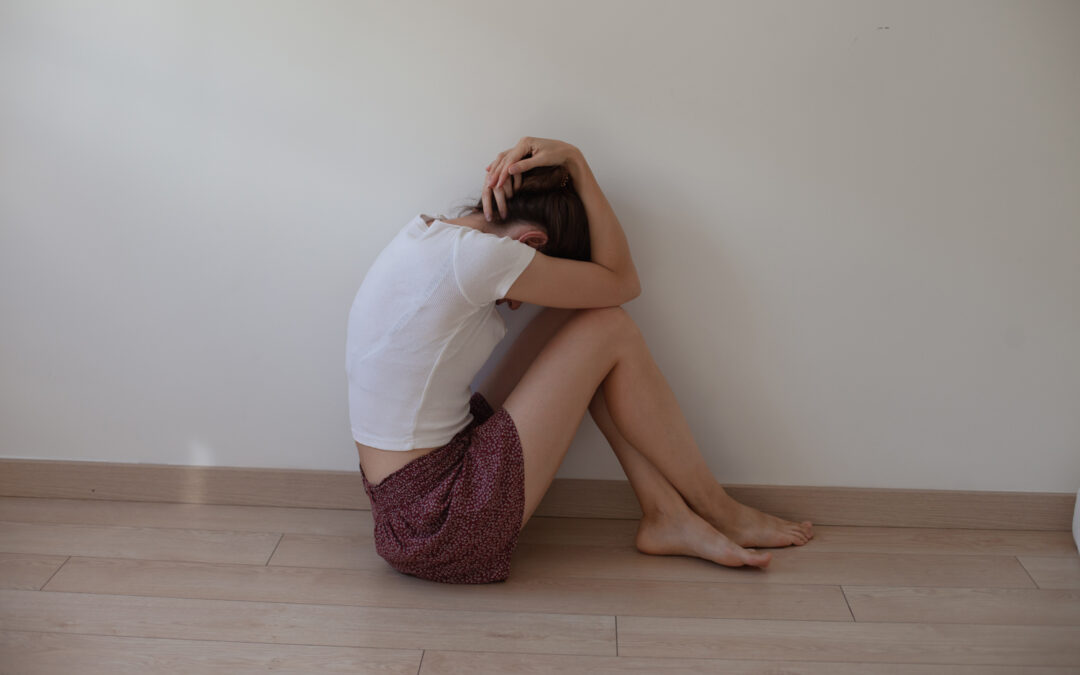When I start to get anxious, my heartbeat quickens. I feel like I am out of breath even when sitting and taking deep controlled inhales. My stomach suffers, sometimes with a sore ache throughout the day and other times with waves of nausea and vomiting. Other physiological symptoms I experience is rapid breathing, an ache in my chest, tremors, and even a restless feeling that makes sitting still next to impossible. The psychological experience of anxiety is even more devastating. The inability to concentrate on tasks due to your mind wandering is miserable. Feeling isolated and alone in your thoughts can be terrifying. Time sometimes feels as if it is slipping away due to the constant replaying of situations that have occurred or might present in the future. Worry about the past and future are typical characteristics of anxiety. This pervasive worry about specific scenarios can even lead to an ongoing fear of the entire world, causing a paralyzing feeling of being out of control. When my mind goes from one potential outcome to the next, my experience of the present becomes particularly painful, lonely, and paralyzing. Do any of these physical and psychological symptoms sound horrifically familiar? Let me be the first to tell you that there is hope and methods for improving your anxious condition!
Anxiety is a normal response as your body attempts to deal with stress. At times, your body alerts you that you are anxious in order to prepare for an oncoming threat. Anxiety can be life—saving, giving us the extra boost to run in dangerous situations or avoid painful stimuli. Although anxiety is common and can be beneficial in certain contexts, constant suffering from anxiety can lead to a generalized uncomfortable feeling and other unpleasant side effects. These side effects can include physical symptoms like the ones mentioned above, a pervasive fear of the future, and difficulty concentrating. Some forms of anxiety even revolve around social or performance situations, leading a person to avoid trying new things or socializing. In this case, anxiety can cause isolation.
This is all very gloomy. When thinking about this topic I find myself asking: how do you get to the bottom of what is making you anxious? Is there a way to reduce this painful feeling? Understanding anxiety causes and triggers, the difference between an actual and perceived threat, and connecting you with therapy resource to help manage anxiety are all important facets in answering this question.
Examining the causes of anxiety can result in more preparedness in how to respond in future situations where anxiety prevails. Stress is a major cause of anxiety. It is a common assertion that stress is always a negative phenomenon. In actuality, there are good events that can be linked to anxiety. For instance, as a child if you got invited to a birthday party that was bound to make your body get the same symptoms of anxiety in anticipation of the event. The same can be true for adults, such as going on a first date. Stress, despite a negative or positive precursor, often leads to generalized anxiety symptoms. Genetics and your brain chemistry can also affect your levels of anxiety. Any traumatic experience or poor environmental setting can contribute to anxiety. Upon realizing there are many causes, the next step in treating anxiety is identifying triggers. For instance, noticing you get more anxious when you almost get into an automobile crash is healthy and can cause you to respond quickly in order to avoid the threat. Noticing a major uptick in anxiety as a response to someone greeting you on your way to the elevator is likely a perceived threat that actually has no risk of harm.
While identifying the cause and triggers seems like a no brainer, this alone can be more complicated than anticipated. Knowing that you get anxious when going to the grocery store might seem obvious, but the different aspects feeding into the anxiety may not be so apparent. You have a fear of people perceiving your eating habits, as an example, and possibly have this problem due to negative messages you received in childhood about buying and eating food. This is where counseling can be very advantageous, as therapists like me are trained to help identify causes and warning signs through therapy. As a therapist, I have seen countless clients and learned first and second-hand what is beneficial for treating anxiety. Therapy can aid you in identification, understanding, and coping skills that will prove beneficial in preventing prolonged anxiety symptoms and potential future panic attacks. Remember, there is hope for pervasive anxiety and talk therapy has been shown to be very beneficial on this front. Continuing to combat the unpleasant thoughts that are given to us from fear can prove to be rewarding. Having difficulty achieving this feat alone? The battle with anxiety goblin seems to be a losing one at this point in time? Come see us at Greenway Therapy, our clinicians have experience in walking through these confusing and fearful feelings and symptoms in order to come out on the other side a better person than before. We look forward to hearing from you!
Elaina Taylor is a PLPC at Greenway Therapy. Learn more about her on her BIO page.





